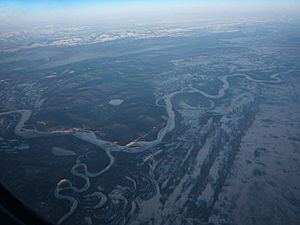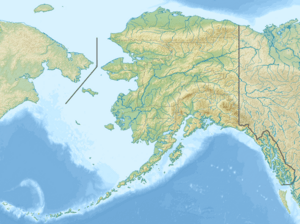Kantishna River facts for kids
Quick facts for kids Kantishna River |
|
|---|---|

Confluence of the Kantishna River (bottom left) with the Tanana River
|
|
|
Location of the mouth of the Kantishna River in Alaska
|
|
| Native name | Khenteethno' |
| Country | United States |
| State | Alaska |
| District | Denali Borough, Yukon–Koyukuk Census Area |
| Physical characteristics | |
| Main source | confluence of McKinley River and Birch Creek near Chilchukabena Lake, Denali National Park and Preserve, Denali Borough 647 ft (197 m) 63°51′58″N 151°33′22″W / 63.86611°N 151.55611°W |
| River mouth | Tanana River 32 miles (51 km) northwest of Nenana, Yukon–Koyukuk Census Area 279 ft (85 m) 64°45′44″N 149°57′56″W / 64.76222°N 149.96556°W |
| Length | 108 mi (174 km) |
| Basin features | |
| Tributaries |
|
The Kantishna River is a river in Alaska, United States. It is about 108 miles (174 kilometers) long. The river gets its start when the McKinley River and Birch Creek join together. This happens inside Denali National Park and Preserve. The Kantishna River helps drain the northern part of the Alaska Range mountains. This includes the area around Denali, which is North America's tallest peak! The river generally flows towards the north-northeast. The Toklat River is another important river that flows into the Kantishna.
Contents
Boating Adventures on the Kantishna River
You can explore the Kantishna River and its smaller streams by boat. People often use canoes, folding canoes, or kayaks. Inflatable canoes and kayaks are also popular choices.
Starting Your River Journey
Some boating trips begin at Lake Minchumina. From there, you travel about 50 miles (80 kilometers) down the Muddy River. This leads to Birch Creek. You then continue downstream to where Birch Creek meets the McKinley River. This is where the Kantishna River officially begins! Finally, you float down the Kantishna River until it reaches the Tanana River.
River Difficulty: Class I (Easy)
The entire trip from Lake Minchumina to the Tanana River is considered Class I. This means it's an easy journey. It's great for beginners or those who want a calm ride. However, there are still some things to watch out for. Strong winds can make Lake Minchumina tricky. Also, look out for trees hanging over the water, stumps, and logs in the streams.
Exploring Moose Creek
Another exciting option is to float down Moose Creek. This trip can start near Wonder Lake or the town of Kantishna. You can float about 50 miles (80 kilometers) on Moose Creek. It then joins the Kantishna River in the middle section, near Bearpaw.
River Difficulty: Class II (Medium)
The Moose Creek part of the journey includes Class II rapids. This means the water is a bit more challenging. It has some medium difficulty sections. After Moose Creek joins the Kantishna, the rest of the trip to the Tanana River is the same as the Lake Minchumina route.
 | Stephanie Wilson |
 | Charles Bolden |
 | Ronald McNair |
 | Frederick D. Gregory |


